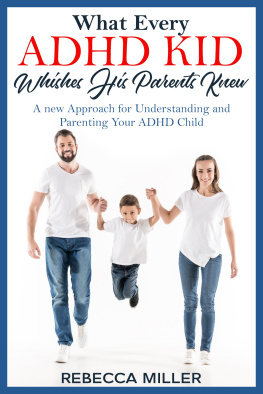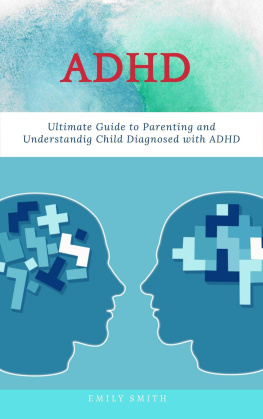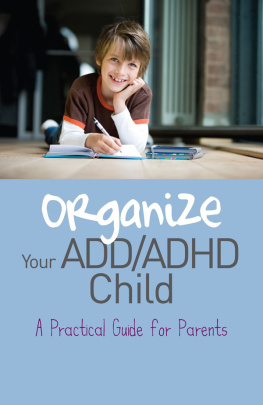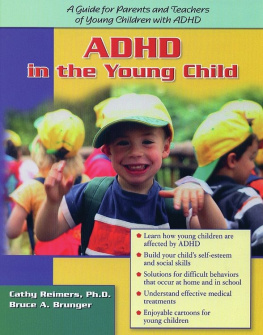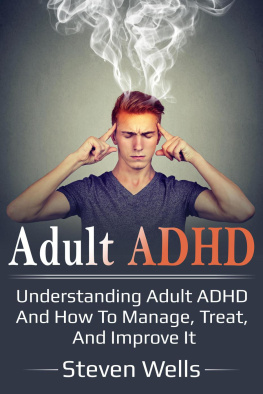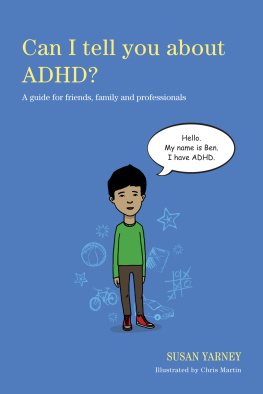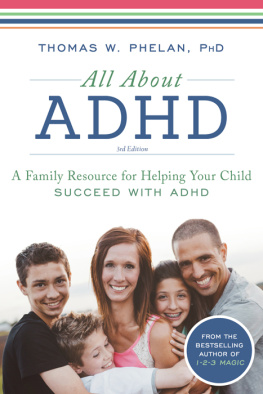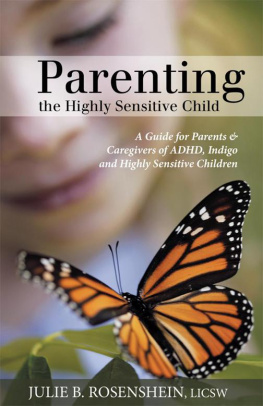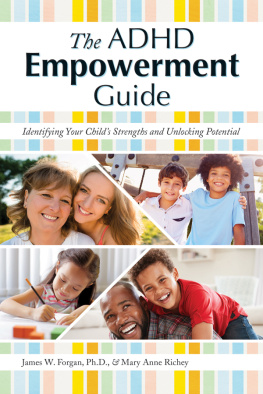What Every
ADHD Kid
Whishes His Parents Knew:
A new Approach for Understanding and Parenting Your ADHD Child
Rebecca Miller
Copyright 2019 by Rebecca Miller - All rights reserved.
The content contained within this book may not be reproduced, duplicated or transmitted without direct written permission from the author or the publisher.
Under no circumstances will any blame or legal responsibility be held against the publisher, or author, for any damages, reparation, or monetary loss due to the information contained within this book. Either directly or indirectly.
Legal Notice:
This book is copyright protected. This book is only for personal use. You cannot amend, distribute, sell, use, quote or paraphrase any part, or the content within this book, without the consent of the author or publisher.
Table of Contents
Introduction
The life of a parent with a kid suffering from ADHD (attention deficit hyperactivity disorder) can be extremely challenging and frustrating. If you are a parent to an ADHD child then you may get overwhelmed with all the difficult challenges that you might be facing. However, note that you can make the whole process of caring for and parenting a child with such a condition easier and more manageable.
One thing that you can do is to be as educated about ADHD as possible. That way, you can be a big help to your child in overcoming his/her daily challenges. You will know exactly how you can channel your childs excess energy into positive areas while bringing calmness to the entire family. Your knowledge about ADHD will also help you address the problems exhibited by your child as early and consistently as possible. With that, you can play a major role in his success regardless of his condition.
To inform parents of kids suffering from ADHD is the ultimate goal of this book. This is why this book was created, to shed light on the condition and help parents deal with their childrens condition every step of the way. Through this book, you will become more familiar with ADHD and the different ways you can help your child cope with it. In the end, you will become a more empowered and stronger parent, lending a hand to your child no matter how difficult his condition is.
Chapter 1 Understanding ADHD
ADHD, which is the acronym for attention deficit hyperactivity disorder, is a medical condition characterized by a sufferers difficulty when it comes to paying attention and controlling impulsive behaviors. A person who suffers from this condition may experience restlessness, causing him/her to be constantly active. ADHD is also characterized by certain differences in brain activities and development that might affect the sufferers ability to focus, control himself, or sit still.
If you have a child with this condition then this might greatly affect him at home and school and when it comes to building relationships. ADHD is a very frustrating and challenging condition considering its major impact on a childs life, especially during his formative years.
What Causes ADHD?
As a neurological condition that has a major impact on the focus and attention of kids and adults suffering from it, ADHDs treatment requires a full understanding of what specifically causes it in the first place. As a parent, you surely want to know what triggers your child to experience the symptoms of ADHD. Knowing the cause of this condition can help you identify the most appropriate way to treat your childs case.
Here are just some of the most common ADHD causes and risk factors:
- Some problems with pregnancy Kids born prematurely or those who have low birth weights are at risk of developing ADHD. The same risk is exhibited by children whose mothers experienced risky and difficult pregnancies.
Women who did not stop drinking alcohol and smoking during the time they are pregnant are also prone to giving birth to a child suffering from ADHD. Furthermore, kids with injured frontal lobe found in the brain, which controls emotions and impulses, may also deal with the neurological condition.
- Heredity and genes This condition also seems to run in the family. This means that a child is most likely to develop ADHD if his parents or any of his close family also suffer from it. In some cases, both the child and his parent are even diagnosed with the condition at the same time.
- Brain structure and function Another thing to take note of regarding the causes of ADHD is that those suffering from it have some notable differences in their brain structures and functions from those who do not have the condition.
Studies that involve brain scans even showed that certain brain areas are either smaller or larger in ADHD sufferers than those without it. It was also identified that ADHD sufferers have an imbalance in their brains neurotransmitter levels. There is also a high chance that such chemicals do not function properly.
While no one can pinpoint what is the exact cause of ADHD, the ones mentioned are known to be among the most common triggers. There is also a high likelihood of a child developing ADHD with constant exposure to environmental toxins, like lead. Specific groups of people also display a high risk of suffering from the condition, including those who have epilepsy and brain damage that happened while in the womb or because of a severe head injury during his childhood or adulthood.
Also, contrary to what other parents believe, ADHD has no connection whatsoever to consuming excessive amounts of sugar or too much exposure to television.
Symptoms of ADHD
How do you know if your child is suffering from ADHD and not just a normal bout of hyperactivity? Note that children are naturally hyperactive, so parents might get confused if their childs hyperactivity is normal or already a symptom of the neurological condition.
With that in mind, it helps to gather as much information as you can about the usual signs and symptoms of ADHD to avoid getting misled. Through this, you can act on the problem if it is indeed serious. Another thing to take note of is that those who suffer from ADHD have neurotransmitters (brain chemicals) that seem to function differently.
Sufferers also exhibit major differences in the manner through which their nerve pathways function. Now on to the symptoms - here are just a few of those that you have to watch out for. If your child exhibits most of them then maybe it is time to seek a pediatricians help to have a correct diagnosis.
Hyperactivity
Hyperactivity is an obvious symptom of ADHD. The problem with this is that you might have a hard time distinguishing whether your child is just naturally active or if his hyperactivity is already a sign of the condition. This is the main reason why you should watch your child closely. In most cases, children who display the hyperactive symptoms of ADHD are always on the move.
For instance, your child may do a lot of things all at once, causing him to bounce from one activity to another. You may notice him having difficulty sitting still even if you force him to do so. If you were able to force him to sit, expect him to do so while still displaying other movements, like drumming his fingers, tapping his foot, or shaking his legs.
Also, observe whether your childs hyperactivity is accompanied by:
- Squirming and fidgeting even when sitting
- Frequently getting up to walk or run around
- Climbing or running excessively even in inappropriate times This symptom is characterized in teens as restlessness.
- Excessive talking
- Difficulties doing his hobby or playing quietly
- Problems calming down or relaxing
- Exhibits a short fuse or quick temper
Next page
